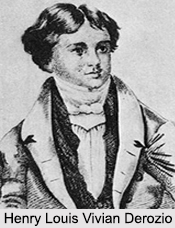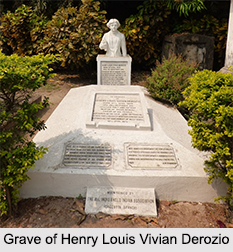 Henry Louis Vivian Derozio was known as a fiery teacher and poet and also assistant headmaster of Hindu College, Calcutta (now Kolkata). It was Derozio who had inspired a group of young people into the spirit of Renaissance and it was this young group who had pioneered the Renaissance Movement in Bengal. Although he was of Anglo-Indian origin he was filled with a patriotic spirit for Bengal. Derozio criticized the social practices and religious beliefs of orthodox Hinduism.
Henry Louis Vivian Derozio was known as a fiery teacher and poet and also assistant headmaster of Hindu College, Calcutta (now Kolkata). It was Derozio who had inspired a group of young people into the spirit of Renaissance and it was this young group who had pioneered the Renaissance Movement in Bengal. Although he was of Anglo-Indian origin he was filled with a patriotic spirit for Bengal. Derozio criticized the social practices and religious beliefs of orthodox Hinduism.
Early Life of Henry Louis Vivian Derozio
Henry Louis Vivian Derozio was born to Francis Derozio on 18th of April in the year 1809. He was born at Entally-Paddapukur of Kolkata and during his childhood had attended the Dhurramtallah Academy School. Right from his childhood, Derozio was a star pupil and excelled in subjects like History, Philosophy and English Literature. Derozio had quit school at the age of 14 years and had started writing poetry being inspired by Ganga River during his stay in Bhagalpur.
Career of Henry Louis Vivian Derozio
At the age 17 years, Henry Louis Vivian Derozio was appointed a teacher of English literature in the Hindu College. The method of teaching that was followed by Derozio was unconventional in nature. His teachings had a critical outlook and it was from him that his students had learnt to reason everything they experienced and denounced everything that did not fit into the realm of reason. He was very popular among his students and his students were known by the name of "Derozians". He infused his pupils with his own rationalism. He had instilled into the minds of his students the essence of free spirit, love for knowledge and a desire to live up to their identity. Under his influence, they came to attack the prejudices and superstitions of Hindu religion.
 Being inspired by Derozio all his students had started questioning the rituals of Hindu religion as a result a massive backlash had taken place against him in the Hindu society because almost everywhere his students had started protesting the orthodox Hindu religion. Due to such a revolutionary attitude Derozio was expelled from the Hindu College by Radhakanta Deb. But even after expulsion Derozio continued his interaction with his students and helped them by taking out several newspapers challenging the uselessness of some of the Hindu customs.
Being inspired by Derozio all his students had started questioning the rituals of Hindu religion as a result a massive backlash had taken place against him in the Hindu society because almost everywhere his students had started protesting the orthodox Hindu religion. Due to such a revolutionary attitude Derozio was expelled from the Hindu College by Radhakanta Deb. But even after expulsion Derozio continued his interaction with his students and helped them by taking out several newspapers challenging the uselessness of some of the Hindu customs.
Henry Louis Vivian Derozio as a Poet
As a poet Derozio was strongly influenced by the English poet Byron and accordingly had written many of his poems following the romantic style. Sometimes Derozio used the pseudonym of “Juvenisâ€. Most of Derozio"s poems had adopted the Vatican style and vividly expressed the story of the Indian land. Many of his poems also voiced a nationalist spirit and an anti-imperialist fervour. This is because he had immense love for his country India and wanted to emancipate it from all troubles. The rationalist philosophy of Derozio was adopted by him from voracious readings of Thomas Paine, David Hume and Jeremy Bentham.
Literary Works of Henry Louis Vivian Derozio
Henry Louis Vivian Derozio wrote many wonderful poems in English before his untimely death. Some of the famous poems written by Derozio were, “The Fakeer of Jungheeraâ€, “To India My Native Landâ€, “The Song of the Hindustanee Minstrelâ€, “The Golden Vase†and a lot more. All these poems of Derozio till today are read with passion and love.
Death of Henry Louis Vivian Derozio
Henry Louis Vivian Derozio had passed away in 1831 AD on December 26th leaving behind his lineage of rationality and free spirit. He died of cholera at an early age of 22 years in Calcutta. His body was buried in South Park Street Cemetery of Kolkata.













